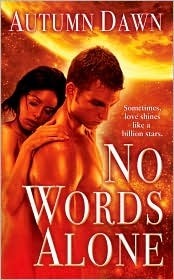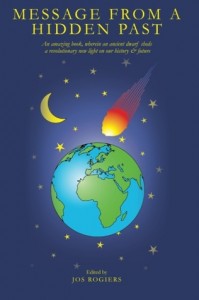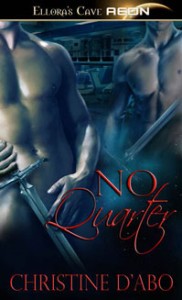I grabbed Autumn Dawn‘s Science Fiction Romance, No Words Alone, off of the KDP free list.
Description from Goodreads:
As the only woman in a team of marooned explorers, whom do you trust–your friends…or your enemy?
When Xera is stranded on a desert planet with a hostile crew and a cadre of murdering aliens, her friends aren’t who she thinks they are. As the translator, she’s the only one who can forge a truce. As the only woman, she’s the prize they lust for, and when her captain turns on her, she’s going to need the help of her enemies to escape his wrath.
Because on this inhospitable world, the warlike Scorpio were her only chance. Looking into the fiery eyes of their handsome leader, Xera saw a nobility and potency she’d never before encountered–a reaction she knew her fellow humans would despise. A future with Commander Ryven was…something to consider. But first they had to survive.
Review:
For the most part I enjoyed this book. It starts out by introducing us to Xera and her crew mates. They’re in a bit of a tight spot, having crash-landed on a hostile planet with the enemy. It’s tense, but the two groups need each-other to survive. It all felt a little reminiscent of the movie Pitch Black really—the beasts come out at night and all. Shortly thereafter Xera’s thoughts, quite reasonably, turn to her very specific danger as the only woman among a group of unknown, probably dangerous alien males and the definitely not all together trustworthy men of her own crew. Lucky for Xera the enemy captain, Ryven, seems to have a soft spot for women and sees to her safety.
I had a few issues though. I say Xera’s fears were reasonable and they were (almost any woman would recognise them), but part of me had to wonder how likely it would be for a woman to be on the crew in the first place if the risk was so real. There really is something to be said for not PUTTING YOURSELF into dangerous situations. Ryven was wonderful. He was smart, ruthless, kind, and loyal. He seemed to understand human nature enough to recognise the signs of danger in Xera’s crew. The problem was there wasn’t any reason he should understand human nature. He’s a Scorpio and Scorpio men apparently aren’t anything like human men.
I liked this beginning far better than the rest of the book if I’m honest. The beginning is Sci-fi, the rest is predominantly romance. Yes they go out on the occasional space ship and encounter the occasional hostile alien, but it’s mostly about Xera, Ryven and the process of Xera settling into her new life with Ryven. I like a good romance as much as the next person but this one has all the hallmarks of being too positive. Too positive? Yes, too positive. A totally hot, kind, considerate, rich, heir to government falls in love with Xera on sight, then rescues her and takes her home to his wonderful family, who welcome her with open arms. She helps the downtrodden princess, thumbs her nose at local gender expectations without repercussions, and despite being an alien from a trespassing race is accepted by the populace at large. Granted, she wasn’t really given any choice in the matter of marriage, but could it really all of been so painless? She never even bothered to fight it.
The problem with narratives of this sort is that you know in advance that nothing really bad is going to happen. Everything will work out in her favour one way or another, be it realistic or not. That takes a lot of the suspense out of the story. I also was extremely saddened to think that even after humanity colonises the stars basic patriarchal attitudes towards women and sexual virtue would still hold such a strangle hold on Xera.
Having made my complaints I have to reiterate that I did enjoy the read. I liked almost all of the Scorpio men. Xera was easy to relate to, and the book was well written, without too many editorial mishaps. If I see the sequel on the free list I’ll definitely grab them.


